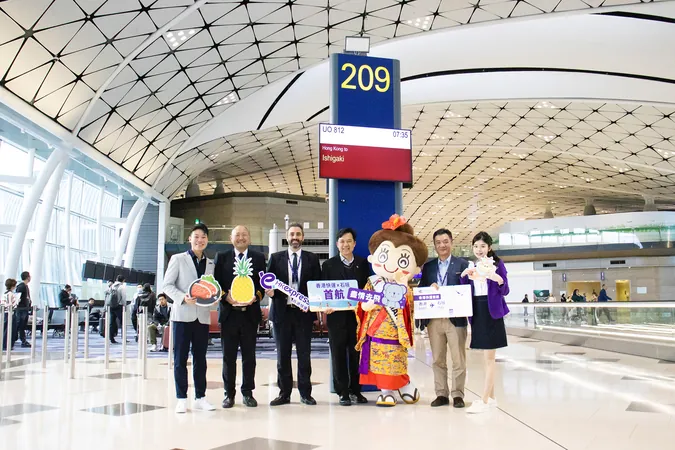
Has Hong Kong's Property Buying Spree in London Come to an End? Not Quite!
2025-04-03
Author: Ying
In-Depth Analysis: The Rise and Fall of Hong Kong's Real Estate Investments in London
For years, Hong Kong investors have been synonymous with London's commercial real estate market, representing a significant source of capital that transformed the city’s skyline. The late 2010s marked a high point, as London became a magnet for Hong Kong-based investments lured by economic stability and lucrative long-term returns. This prime overseas property destination was not only appealing for investment but also served as a coveted travel spot, offering cultural experiences and top-tier educational opportunities.
Yet, this narrative is shifting dramatically. Hong Kong investors have transitioned from aggressive buyers to net sellers of London properties, influenced by geopolitical changes and evolving economic factors. This article examines how Hong Kong's investment landscape in London changed from a booming buying spree to a notable retreat, highlighting the key forces driving this reversal.
Between 2017 and 2018, Hong Kong investors invested a staggering £5.9 billion into London’s office market alone, dominating 37% of the market share. This influx was unprecedented, outpacing total investment levels from the previous three decades combined. The momentum continued into 2018, with Hong Kong capital hitting approximately £8.5 billion, making headlines with notable acquisitions, including the iconic Leadenhall Building (the 'Cheesegrater') and 20 Fenchurch Street (the 'Walkie Talkie'). These trophy assets illustrated Hong Kong’s zest for London real estate.
Moreover, the luxury retail segment thrived as well, with investors snapping up premium locations on Bond Street and Oxford Street. This trend underscored a belief in the long-term value of properties in one of the world’s most desirable shopping districts.
However, the tide began to turn. In 2024, Hong Kong investors accelerated their divestments, listing over £2 billion worth of commercial properties for sale. Noteworthy assets included One Kingdom Street and Vodafone’s London headquarters. This series of high-value disposals marks one of the most significant sell-offs of Hong Kong-owned properties in recent history, suggesting a strategic pivot amid shifting market dynamics.
The motivations for this retreat are multifaceted. Many investors began to realize profits from their acquisitions during the 2015-2018 period, generating substantial returns from well-timed sales. For instance, CK Asset's sale of the UBS headquarters at 5 Broadgate fetched £1.21 billion—approximately £108 million above its purchase price, bolstered by favorable currency exchanges. Nevertheless, not every sale was executed profitably. A cooling London real estate market has left some investors facing depreciated asset values, leading to distress sales under mounting financial pressures as interest rates have soared globally.
The stark contrast in investor behavior is palpable. During peak investment years, Hong Kong investors constituted more than one-third of all capital inflow into Central London. However, 2024 marked a significant shift, with net disposals exceeding acquisitions by £1.1 billion. This pattern signals increased caution among foreign investors, with many, including those from Hong Kong, reassessing their international holdings amid a backdrop of economic uncertainty and regulatory scrutiny limiting the movement of substantial capital.
In Hong Kong itself, the real estate market has faced its challenges. With high vacancy rates and declining retail sales—down 7.3% in 2024 compared to the previous year—the pressure has mounted for these investors. Despite a recent uptick in tourism, spending habits have shifted toward experiences and food over retail, compelling retailers to reassess their strategies.
The global rise in interest rates has also played a critical role. What was once a landscape characterized by cheap financing has now turned into a high-cost borrowing environment. Investors who heavily leveraged their investments during the buying spree are now squeezed by rising debt service costs at a time when asset valuations are stagnating.
As we consider the future, London’s reputation remains intact. It continues to be the top choice for investments, as signaled by the 2025 Investor Intentions Survey. Capital values appear to have stabilized, and we’re witnessing renewed bidding activity and investment flows as the market demonstrates resilience. Factors such as London's transparent legal infrastructure, liquidity, and status as a global financial hub enhance its allure.
So, while the fire of Hong Kong investment in London real estate may have dimmed for now, the foundations are still in place for a resurgence. Once overcoming current hurdles, it’s very likely we’ll see a new wave of investment pouring back from Hong Kong into the promising corridors of London—further solidifying its status as their premier overseas investment destination.
Stay tuned for what promises to be the next chapter in this evolving narrative.



 Brasil (PT)
Brasil (PT)
 Canada (EN)
Canada (EN)
 Chile (ES)
Chile (ES)
 Česko (CS)
Česko (CS)
 대한민국 (KO)
대한민국 (KO)
 España (ES)
España (ES)
 France (FR)
France (FR)
 Hong Kong (EN)
Hong Kong (EN)
 Italia (IT)
Italia (IT)
 日本 (JA)
日本 (JA)
 Magyarország (HU)
Magyarország (HU)
 Norge (NO)
Norge (NO)
 Polska (PL)
Polska (PL)
 Schweiz (DE)
Schweiz (DE)
 Singapore (EN)
Singapore (EN)
 Sverige (SV)
Sverige (SV)
 Suomi (FI)
Suomi (FI)
 Türkiye (TR)
Türkiye (TR)
 الإمارات العربية المتحدة (AR)
الإمارات العربية المتحدة (AR)